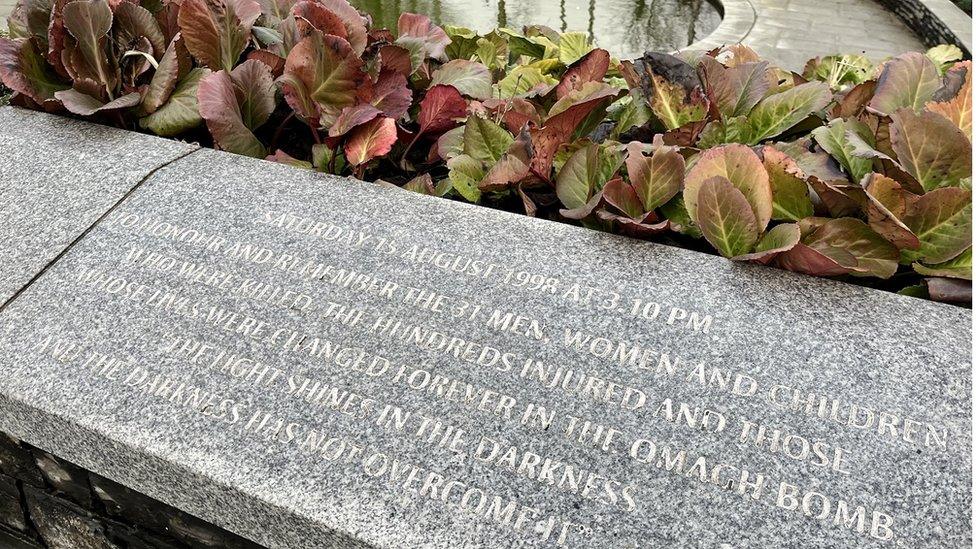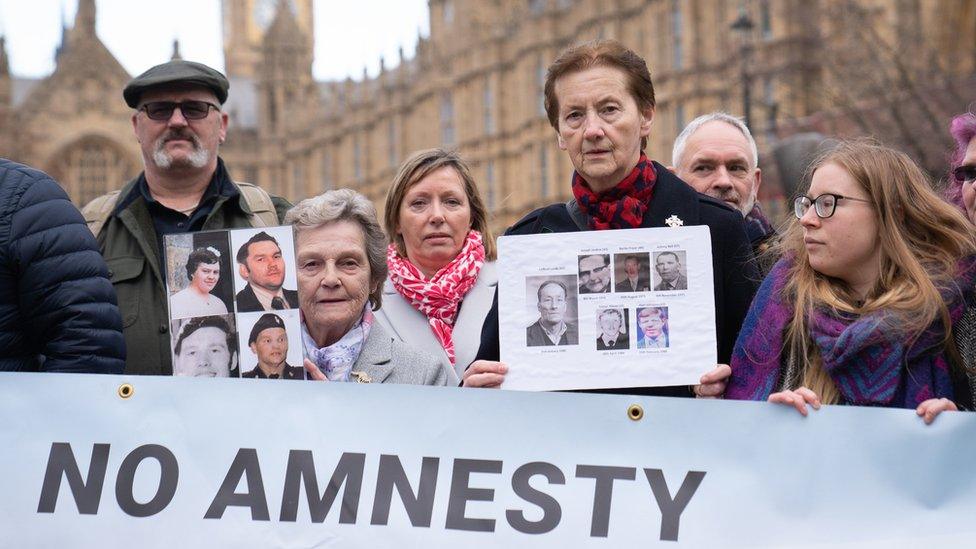Troubles legacy: Government showing 'inconsistent approach'
- Published
Baroness Smith says the government's decision to call an inquiry into the Omagh bombing is inconsistent with its Troubles legacy
A Labour peer claims the government is showing an "inconsistency in approach" to dealing with the legacy of the Northern Ireland Troubles.
Baroness Angela Smith suggested there was an inconsistency by granting an inquiry into the Omagh bomb while pushing ahead with the legacy bill.
Last week, the government announced a judge-led statutory inquiry into the 1998 bombing.
The legacy bill would see a ban imposed on legal actions and inquests.
The inquiry into the Omagh bombing, which claimed the lives of 29 people, will consider if it could have been prevented by security forces.

Bereaved families have been campaigning for an inquiry into the bombing for more than a decade
The Real IRA attack happened four months after the Good Friday Agreement, which the government is using as a cut-off point to its Legacy bill.
Under the legislation, which offers conditional immunity to perpetrators, future investigations into Troubles incidents between 1966-1998 would be limited, as well as a ban imposed on legal actions and inquests.
Baroness Smith said: "We generally welcome the approach the government is taking [on Omagh].
"But it is impossible not to note that it is different from the Legacy Bill.
"I am not aware, even with all the work undertaken, that the government has managed to deliver any significant support for the bill going forward."

What is the legacy bill?
Legislation that aims to draw a line under the Northern Ireland Troubles by dealing with so-called legacy issues
The Northern Ireland Troubles (Legacy and Reconciliation) Bill runs to almost 100 pages
It was introduced in May in an attempt to deal with more than 1,000 unsolved killings
A central element involves immunity from prosecution for those who co-operate with investigations run by a new information recovery body
Victims' groups, the Irish government and political parties at Stormont are opposed to the bill, arguing it will remove access to justice for victims and their families
Veterans Commissioner Danny Kinahan gave the bill a cautious welcome and it is also supported by the Northern Ireland Veterans Movement
The bill had its second reading in the Lords on 23 November. The government told peers it would bring forward amendments including "a more robust process" around immunity from prosecution
Lord Caine of the Northern Ireland Office (NIO) said the Independent Commission for Reconciliation and Information Recovery (ICRIR) would be able to conduct criminal investigations
He said he would be "very, very surprised" if he does not table more amendments to the bill.

In response, Northern Ireland Office minister Lord Jonathan Caine said Omagh was by definition outside the scope of the bill.
"Were it to be in, it would have a consequence which I do not think would be welcomed across the house, enabling people who were involved in dissident republican activities to apply for conditional immunity," he said.
"I do not entirely accept there is some kind of total contrast between what we are doing on Omagh and what we are doing on legacy.
NI Secretary says the decision to hold an inquiry is significant
"Not every case can have a public inquiry."
Former First Minister Baroness Arlene Foster urged the government to put pressure on Dublin to hold a similar inquiry into Omagh.
"It was planned and prepared in a different jurisdiction and if we are to get totality of answers that needs to happen as well," she said.
Lord Caine said he took the issue seriously and he will be raising it with Irish government ministers soon.
- Published2 February 2023

- Published2 February 2023

- Published31 January 2023
